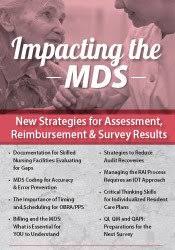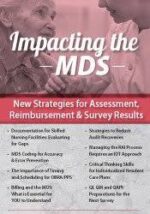Available for Pre-Order. This product will be available within a few days.
Daniel Laffery – Impacting the MDS
Description:
The MDS has become one the most important documents in long-term care. It not only is a key resident assessment tool, it drives your reimbursement, care plan, survey, 5 Star rating – and more! An interdisciplinary team who has a strong understanding of the RAI process can make your facility rise or fall. The MDS has evolved and requires more than just the basic understanding; it requires complex critical thinking skills and an understanding of the impact on each item coded.
Daniel Laffery, RN, RAC-CT, the presenter for this hard hitting, comprehensive day, will share new strategies to effectively deliver care that rises well above the standard. Topics will include:
Documentation for Skilled Nursing Facilities: Evaluating for Gaps
MDS Coding for Accuracy & Error Prevention
The Importance of Timing and Scheduling for OBRA/PPS
Billing and the MDS: What is Essential for YOU to Understand
Strategies to Reduce Audit Recoveries
Managing the RAI Process Requires an IDT Approach
New Critical Thinking Skills for Individualized Resident Care Plans
QI, QM and QAPI: Preparations for the Next Survey
OUTLINE
Pulling it All Together: Key Documentation Required for SNFs
Different approaches to comprehensive clinical documentation
Components of documentation as it relates to the MDS specifically
What about the “holes” in documentation?
Strategies to evaluate current documentation practices for gaps
Coding of the MDS: Are You Confident in Your Assessments?
Appropriate interpretation of the question
Taking credit for the care delivered – across the interdisciplinary team
How and when to conduct resident interviews
The financial impact on reimbursement
Key sections of the MDS: Demonstration of accurate (and inaccurate) coding
MDS Coding for OBRA and PPS
Qualifying for a Medicare benefit
Tips to manage the Medicare stay
The most common MDS coding errors – and how to avoid them!
The “normal” PPS schedule – as well as special circumstances
Considerations when setting the ARD (timing/scheduling)
Managing the OMBRA schedule – and the impact on reimbursement
Medicare Compliance: The Clinical and Billing Connection
Calculation of RUGs from the MDS (accounting for acuity)
HIPPS codes and the impact on payment dates
How payment dates are determined based on MDS coding
Implementation of a “Triple Check Process” prior to submission of the UB04
Strategies to reduce audit recoveries
Managing the RAI Process Requires an Interdisciplinary Approach
Do you really understand how CATs are triggered?
Determine root cause of a CAT
The components of a CAA – and how it links to the care plan
Individualized Care Plans: Achieve the Goal of Person-Centered Care
Best practice standards
Learn how critical thinking can be applied to the assessments
Methods to successfully link it all together:
Person-Centered Care, Standards of Practice, Pay-for-Performance, Medicare, and Survey Results
Quality Measures/Quality Indicators: Use the Data to Improve Facility Operations and Delivery of Care
Prepare yourself….the impact and role of QI/QM in the survey process
Do you know how to validate the QI/QMs as compared to MDS coding?
Your QAPI process: Incorporate the QI/QM results for improvement
OBJECTIVES
Evaluate new strategies to manage the documentation required for Skilled Nursing Facilities.
Practice coding of the Minimum Data Set (MDS) for key sections to avoid future errors.
Demonstrate the essential considerations for OBRA and PPS timing and scheduling.
Formulate new approaches to ensure compliance with Medicare intent and reduce audit recoveries.
Manage the RAI process through an efficient, yet comprehensive, interdisciplinary approach.
Design individualized resident care plans to incorporate unique interventions and approaches to care.
Explain how Quality Measures/Quality Indicators can improve facility operations and delivery of care.
Would you like to receive Daniel Laffery – Impacting the MDS ?
ABOUT THE SPEAKER
Daniel Laffery, RN, RAC-CT, is the Operational Manager of the largest Long-Term Care Consulting firm in Kansas, serving over 150 providers in Kansas and Missouri and more than 4,500 elders. In this position, Daniel has been able to assist providers to analyze a vast variety of “opportunities”, such as going from operating in the red to operating in the black, navigating complex survey compliance issues, and RAC audit prevention and reduction of recoupment. He is currently a member of LeadingAge of Kansas, Kansas Health Care Association, and the American Association of Nurse Assessment Coordination, as well as an active Board Member for Kansas Culture Change Coalition. Daniel holds current certification as a Resident Assessment Coordinator through the American Association of Nurse Assessment Coordination. Previously, he served in long-term care as a certified nursing assistant, charge nurse, MDS coordinator, Director of Nursing, and Nurse Consultant. Daniel’s expertise has been sought through educational presentations to assist SNF interdisciplinary audiences to optimally understand the complexities associated with the MDS.
Speaker Disclosures:
Financial: Daniel Laffery is the Operation Manager for Sunflower L.T.C. Consultants, LLC. He receives a speaking honorarium from PESI, Inc.
Nonfinancial: Daniel Laffery has no relevant nonfinancial relationship to disclose.








